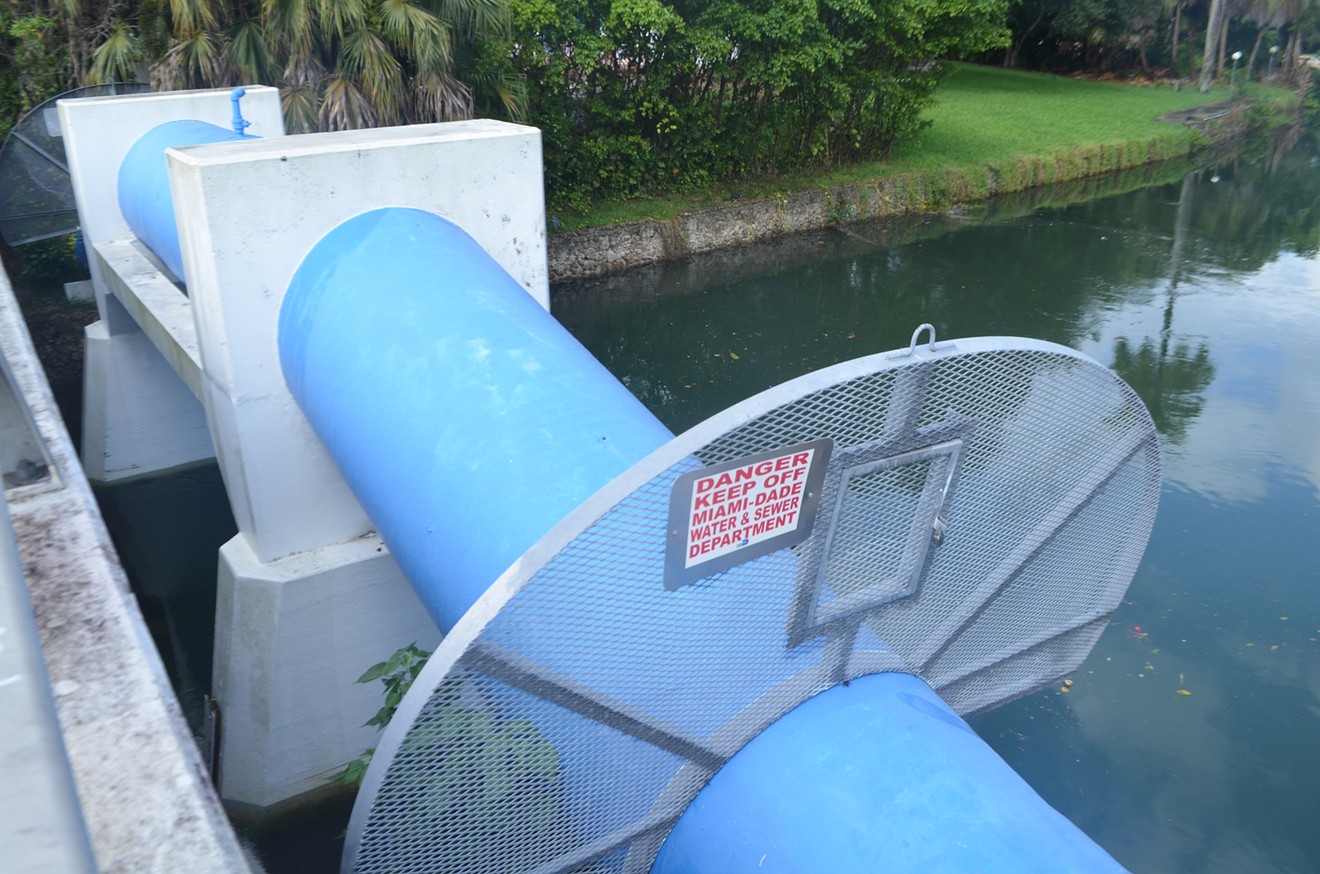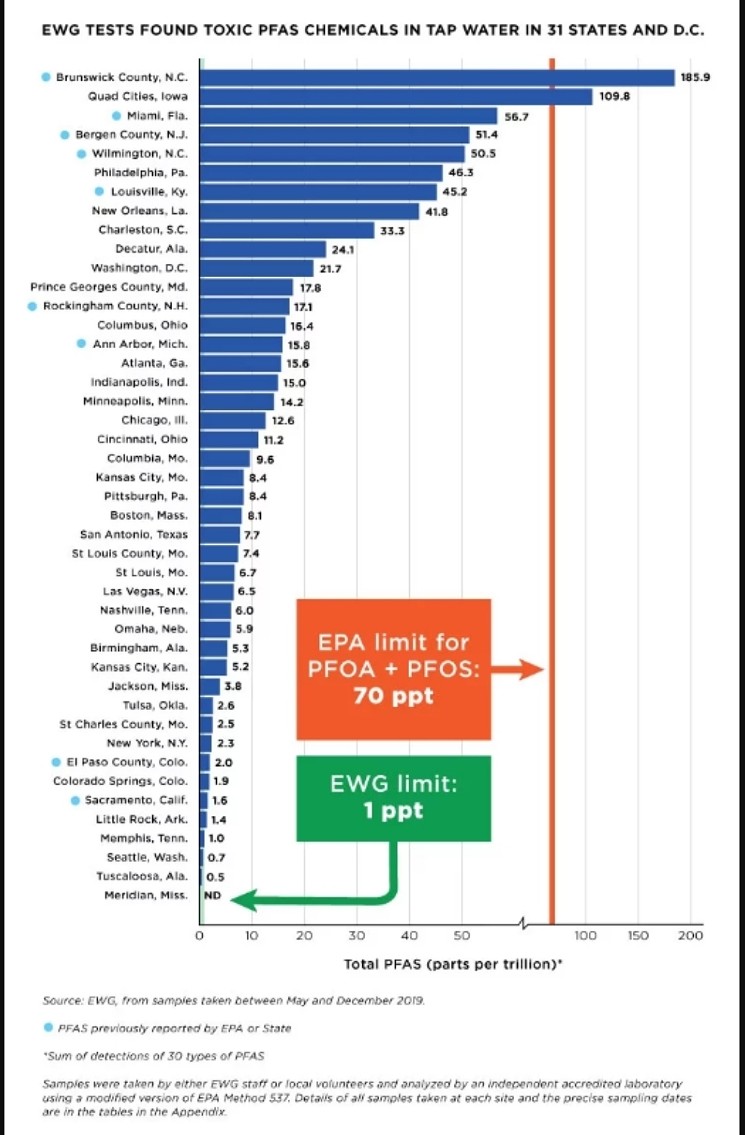The same chemicals found in fire-extinguishing foam and fast-food packaging have been found in Miami-Dade's drinking water, according to new data published yesterday by an environmental watchdog group.
The Environmental Working Group (EWG), a consumer advocacy nonprofit, says it found per- and polyfluoroalkyl substances in the water supply in dozens of major U.S. cities. The chemicals, better known as PFAS, are found in a wide variety of household and commercial products, including nonstick cookware, cleaning solutions, and fire extinguishers.
From May to December 2019, the nonprofit tested 44 sites across 31 states and Washington, D.C., for traces of 30 kinds of PFAS. According to the organization, water tested in the Miami area ranked third highest in the nation for levels of PFAS. Though the chemicals found in Miami-Dade's water did not exceed guidelines set by the federal government, the EWG believes even small amounts of PFAS can be harmful to human health.
Reached by New Times, a spokesperson for the Miami-Dade Water and Sewer Department didn't refute the group's findings but emphasized that the local drinking water is safe and that "there is nothing to be concerned about."
"No drinking water that [the county] provides to its customers have any amounts that exceed the guidelines that come into their homes," Jennifer Messemer-Skold said. "Various stakeholder groups may have their own opinions on the matter, [but] we as a utility regulator are required to conform to government standards."
The existence of these chemicals in drinking water has been on the radar of the U.S. Environmental Protection Agency (EPA) since at least 2001, according to EWG, which says the federal government does not regulate how much of the chemicals end up in local water supplies.
Instead, the EPA offers guidelines for state and local agencies that are meant to be a sort of gauge. PFAS levels in water supplies, according to the government, should not be more than 70 parts per trillion. (Miami's levels are below that level, around 57 parts per trillion in EWG's findings.) EWG, however, says some studies show that PFAS levels of only one part per trillion are recommended as safe.
PFAS chemicals, according to the group, have been linked to a host of medical issues, including certain kinds of cancer and thyroid disease. The substances are largely bioaccumulative, meaning that once traces are introduced into the environment or your body, they tend to stick around. That's why EWG sometimes refers to them as "forever chemicals."
University of Rhode Island professor Rainer Lohmann has spent the last few years trying to better understand PFAS and how they interact with local water supplies. Lohmann conceded that the federal threshold for measuring PFAS levels might not be stringent enough to protect consumers.
"The worst [thing] is for a state such as Florida to pretend that there is neither a problem with PFAS nor contamination of drinking water," he wrote in an email to New Times.
In addition to Miami, cities such as Philadelphia, Louisville, New Orleans, and Wilmington were among the other high-populous metro areas containing some of the greatest levels of PFAS chemicals in tap water.
"The results confirm that the number of Americans exposed to PFAS from contaminated tap water has been dramatically underestimated by previous studies, both from the Environmental Protection Agency and EWG's own research," the latest EWG report states.
[
{
"name": "Air - MediumRectangle - Inline Content - Mobile Display Size",
"component": "19274298",
"insertPoint": "2",
"requiredCountToDisplay": "2"
},{
"name": "Editor Picks",
"component": "17482312",
"insertPoint": "4",
"requiredCountToDisplay": "1"
},{
"name": "Inline Links",
"component": "18711090",
"insertPoint": "8th",
"startingPoint": 8,
"requiredCountToDisplay": "7",
"maxInsertions": 25
},{
"name": "Air - MediumRectangle - Combo - Inline Content",
"component": "17482310",
"insertPoint": "8th",
"startingPoint": 8,
"requiredCountToDisplay": "7",
"maxInsertions": 25
},{
"name": "Inline Links",
"component": "18711090",
"insertPoint": "8th",
"startingPoint": 12,
"requiredCountToDisplay": "11",
"maxInsertions": 25
},{
"name": "Air - Leaderboard Tower - Combo - Inline Content",
"component": "17482313",
"insertPoint": "8th",
"startingPoint": 12,
"requiredCountToDisplay": "11",
"maxInsertions": 25
}
]













